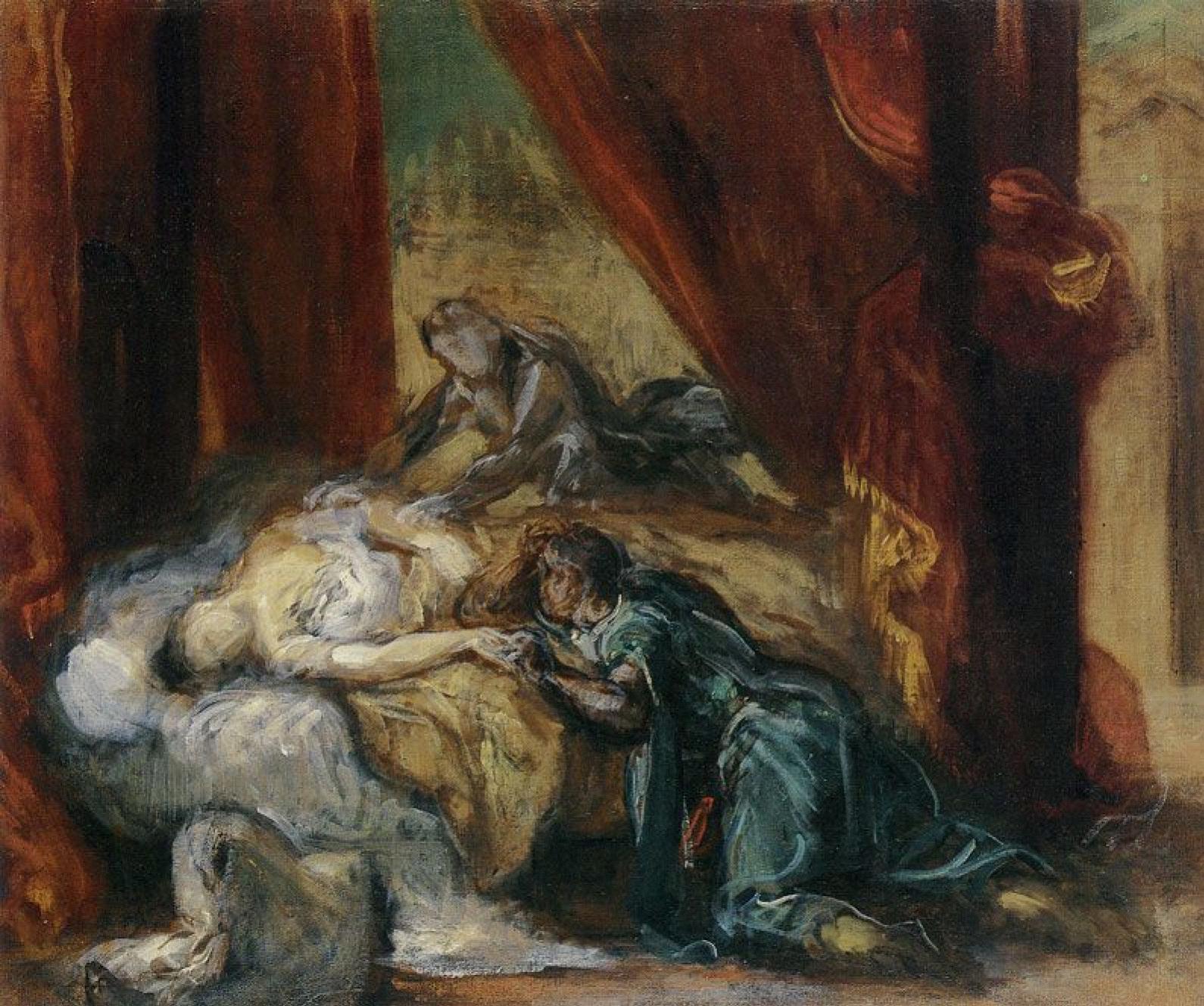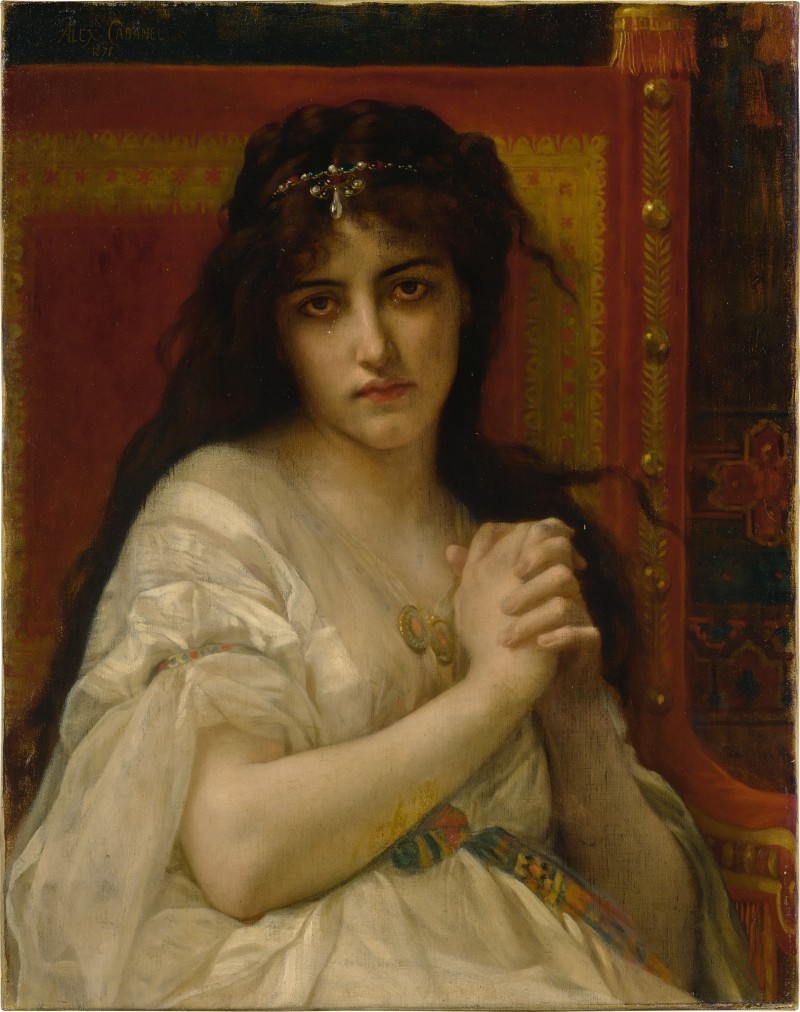Desdemona, the wife of Othello, is one of the tragic characters in Shakespeare’s play, Othello. The play revolves around the themes of envy, betrayal, and jealousy. Desdemona’s death is a significant moment in the play and is the result of Othello’s misplaced jealousy and anger towards her.
Desdemona’s death occurs in Act V, Scene ii of the play. Othello, who believes that Desdemona has been unfaithful to him, decides to kill her. At first, he contemplates cutting her into pieces or poisoning her. However, Iago suggests that he strangle her instead. Othello agrees and sets out to do the deed.
When Othello enters the room where Desdemona is sleeping, she awakens and sees the anger in his eyes. She tries to defend herself, but Othello overpowers her. He smothers her with a pillow from their own bed. Desdemona’s final moments are heartbreaking as she pleads for her life and professes her love for Othello.
Desdemona’s death is significant in the play beause it highlights the destructive power of jealousy and misguided anger. Othello’s jealousy towards Desdemona stems from his fear of losing her. He believes that she has been unfaithful, despite her protestations of innocence. Othello’s decision to kill Desdemona is an act of desperation born out of his own insecurities and fears.
Desdemona’s death is also significant because of the way she dies. She is killed by her own husband, someone who was supposed to love and protect her. Her death is a tragic reflection of the power dynamics at play in their relationship. Desdemona is a victim of her husband’s misplaced anger and jealousy.
Desdemona’s death is a pivotal moment in Shakespeare’s play, Othello. It highlights the destructive power of jealousy and the tragic consequences that can result from it. Desdemona’s death is a reflection of the power dynamics in her relationship with Othello, and it is a reminder of the importance of trust and communication in any relationship.
The Killing of Desdemona
Desdemona, a character in William Shakespeare’s play Othello, is killed by suffocation. Her husband, Othello, is the one who murders her. At first, Othello contemplates different methods of killing her, including chopping her into pieces and poisoning her. However, he ultimately decides to suffocate her with a pillow.
The scene where Desdemona is killed takes place in her bedchamber. Othello enters the room and confronts her about her alleged infidelity with Cassio. Desdemona protests her innocence, but Othello refuses to believe her. He accuses her of lying and betraying him, and then he smothers her with a pillow from thir own bed.
It is worth noting that Othello is not acting alone in this crime. His trusted advisor, Iago, has been manipulating him throughout the play, and has planted the idea in Othello’s mind that Desdemona is unfaithful. Iago is not present in the room when Desdemona is killed, but he is indirectly responsible for her death.
Desdemona is killed by suffocation with a pillow. The act is committed by her husband, Othello, who is driven to jealousy and rage by Iago’s machinations. The murder takes place in Desdemona’s bedchamber, and is a pivotal moment in Shakespeare’s play Othello.

Source: arthive.com
The Motivation Behind Othello’s Killing of Desdemona
Othello, the protagonist of the play “Othello” by William Shakespeare, kills his wife Desdemona because he believes she has been unfaithful. Othello is a man of high honor and integrity, but his tragic flaw is his jealousy and insecurity, which leads to the destruction of his marriage and ultimately his own downfall.
Throughout the play, Othello is consumed by jealousy and suspicion that his wife Desdemona has been unfaithful to him with his friend and lieutenant, Cassio. He is manipulated by the villainous Iago, who plants false evidence of infidelity and convinces Othello that Desdemona has been unfaithful.
Despite Desdemona’s protestations of innocence and her unwavering love for Othello, he becoms increasingly convinced of her guilt and ultimately decides to take matters into his own hands. In a fit of rage, Othello smothers Desdemona to death, believing that he is punishing her for her supposed infidelity.
It is important to note that Othello’s actions are not justified, and his jealousy and violence towards Desdemona are a reflection of his own flaws and weaknesses. His lack of trust in his wife and inability to communicate effectively with her ultimately lead to the tragic end of their relationship.
Othello kills Desdemona because of his overwhelming jealousy and suspicion of her infidelity. His tragic flaw of insecurity and lack of communication ultimately lead to the destruction of his marriage and his own downfall.
Desdemona’s Last Words Before Her Death
Desdemona’s last words before she dies are a testament to her submissive and loyal nature. In response to Emilia’s inquiry of who has committed the heinous deed of murdering her, Desdemona takes full responsibility for her own death, claiming that nobody else is to blame but herself. She bids farewell and asks to be remembered to her husband, whom she refers to as her “kind lord.”
This final statement showcases Desdemona’s unwavering love and respect for her husband, despite the fact that he is the one who ultimately brings about her demise. It also highlights her willingness to accept blame for a crime she did not commit, furher displaying her submissive nature.
Desdemona’s last words before she dies are a poignant reflection of her character, showcasing her loyalty and submissive nature towards her husband, even in the face of death.
The Tragic Death of Desdemona
In William Shakespeare’s tragedy “Othello,” the character of Desdemona must die due to a combination of several factors. Firstly, she is seen as a threat to Othello’s honor and reputation. Othello believes that Desdemona has been unfaithful to him with Cassio, one of his trusted lieutenants. This belief is fueled by the manipulations of Iago, who plants seeds of doubt in Othello’s mind about his wife’s fidelity.
Secondly, Desdemona’s death is also a result of Othello’s own insecurities and jealousy. His deep love for Desdemona is mixed with a sense of possessiveness and a need to control her. When he believes that she has betrayed him, he is unable to handle the emotional turmoil and decides that she must die.
Desdemona’s death serves as a tragic consequence of the play’s themes of racism and sexism. Desdemona is a white woman married to a black man, a union that was considered taboo in Shakespeare’s time. Othello’s jealousy and violence toards his wife can be seen as a manifestation of the societal pressures and prejudices that he faces as a black man in a predominantly white society.
Desdemona’s death in “Othello” is a complex and tragic event that is the result of a combination of factors, including Othello’s jealousy and insecurities, Iago’s manipulations, and the societal pressures of racism and sexism.

Conclusion
Desdemona’s death in “Othello” is a tragic event that is caused by the jealousy and rage of her husband Othello, who wrongly believes that she has been unfaithful. Despite her innocence and loyalty to Othello, Desdemona is unable to convince him of her fidelity, and ultimately meets her untimely end at the hands of her own husband. The brutal murder of Desdemona by suffocation with a pillow is a heart-wrenching moment in Shakespeare’s play, which highlights the destructive power of jealousy and the tragic consequences of unfounded accusations. The death of Desdemona serves as a reminder of the importance of trust, communication, and understanding in relationships, and the devastating consequences that can result from the absence of thse qualities.
